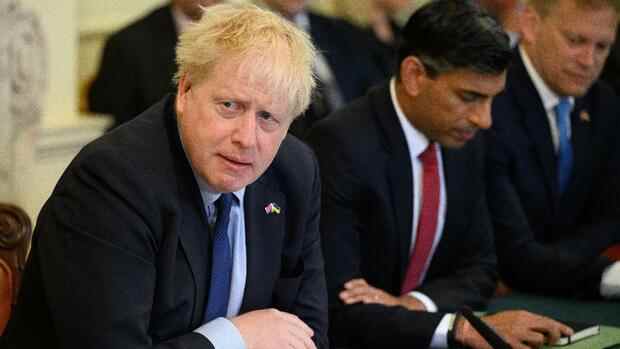Boris Johnson, Prime Minister of Great Britain, chairs a cabinet meeting at 10 Downing Street.
(Photo: dpa)
London The day after the vote of no confidence in Boris Johnson narrowly failed, nobody in London really knew what to do with the result. The politically ailing prime minister won the vote by 211 to 148 votes. However, the question of how much trust the prime minister still has in his own ranks remained unanswered.
Johnson himself called his victory, which was much narrower than expected, “a very good, convincing result for politics and the country”. His government can now move on and “focus on the things that really matter to the people”.
The 57-year-old also tried to convince his cabinet to follow this message on Tuesday morning. “We can draw a line now,” Johnson said. That sounded more like a request than a statement, though.
The rest of the country reacted to this with Goethe’s doubts: I hear the message well, but I lack the faith. The fact that more than 40 percent of his own faction in the House of Commons voted no confidence in Johnson leaves the prime minister weaker than before the vote of confidence. The fronts in the Conservative Party have not been clarified, but the positions appear hardened.
Top jobs of the day
Find the best jobs now and
be notified by email.
Former British Prime Minister William Hague described his fellow party member Johnson as politically “unable to survive”. He tries to continue with two “flat tires”. Several Tory MPs have indicated they want to continue their opposition to Johnson. “I don’t think it’s over yet,” said former Secretary of State Philip Dunne. Stephen Kerr, leader of the Scottish Conservatives in the House of Commons, described Johnson as damaged: “I don’t know how much longer the Prime Minister can go on.”
Johnson apparently still has support in the cabinet. Deputy Prime Minister Dominic Raab called on his party to “respect” the result and leave the leadership dispute behind. The opposite appears to be the case: Tobias Ellwood, Conservative Defense Committee chairman, hinted to Sky News the Tories could change their party statutes to allow for another no-confidence vote in Johnson within the next 12 months. So far, the rules provide for a gallows period of one year.
The worst economic crisis in 70 years
There are several reasons for the government crisis in Great Britain, which has been escalating for months. Johnson was particularly damaged by the fact that members of the government did not follow the corona rules during the lockdown. The prime minister himself also received a ticket for attending an illegal party. An investigation report (Gray Report) made him politically responsible for the abuses.
In addition, Great Britain is in the deepest economic crisis in 70 years. Inflation is moving towards ten percent. Economic growth has almost come to a standstill. There is a risk of prolonged stagflation.
“We are dealing with an historic shock for real incomes,” Fed Chairman Andrew Bailey recently warned. The cost of living for many Britons has exploded due to rising energy and food prices. The energy bills of most UK households alone will double within a year.
A quick liberation for Johnson is hardly possible. The ailing prime minister announced a number of initiatives in the cabinet: “We will continue with the extensive agenda for which we were elected in 2019,” said Johnson. However, it has little influence on the rapidly increasing energy costs. It is quite possible that he is again looking for a confrontation with the EU over the disputed customs border in Northern Ireland in order to mend the cracks in his party.
Johnson is worse off than Theresa May was before she resigned
Johnson’s fate is compared to that of his predecessor Theresa May in London. The then Prime Minister won her own confidence vote in December 2018 by 200 votes to 117, far more comfortably than Johnson won Monday night’s vote. Today’s Brexit Minister and Johnson confidante Jacob Rees-Mogg described May’s result as “terrible” and demanded her resignation. This happened seven months later under massive pressure from the party.
“I think this is probably the beginning of the end,” John Penrose had predicted before the confidence vote. The prime minister’s anti-corruption agent resigned on Monday morning in protest at Johnson. Historically, after an unconvincing confidence vote, a prime minister’s authority has been so severely weakened “that a few months later he resigns.”
The next mood test for Johnson is already waiting. At the end of June, the ruling Tories face two more defeats when important by-elections are held in the constituencies of Wakefield in West Yorkshire and Tiverton and Honiton in Devon. The conservative majority in the lower house is not endangered by this. But the polls in the two constituencies held by the Tories are considered an important barometer for the bad mood in the country.
More: Boris Johnson wins no-confidence vote – but support continues to crumble
